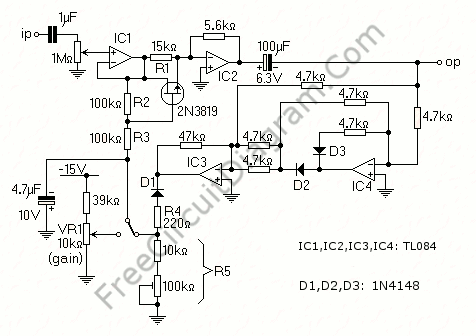TL084 Audio Compressor (AGC)

Compressor or AGC (automatic gain control) is used to manipulate the average amplitide of audio signal, to produce relatively constant volume of signal from high dynamic signal source. The 2N3819 JFET (which is used as a voltage controlled resistor) is the key component. Control voltage which is derived by full-wave rectification followed by a peak detector is provided by the output of the circuit. The fullwave rectifier is called a precision absolute value circuit can be found in Tobey, Graeme and Huelsman’s : “Operational Amplifier” (1971)- page 249. Several matched resistor is required by the circuit for correct operation and alternative versions of this sub-circuit, which require fewer matched resistors and overall fewer components, could be advantageously substituted.

The product of R4 and the 4.7 uF capacitor is determine the attack time. It’s becomes reverse biased when the input signal drops D1 and the decay time constant is determined by R5. (Since the original publication date I have discovered that the term ‘release’ is used rather than ‘decay’ in the case of compressors.) Both time constants are something of a compromise, the decay must be fast enough to allow low amplitude signals shortly following high amplitude ones to be given sufficient gain and the attack must be fast if the start of high amplitude signals are not to be overloaded until the gain reduces. After long periods of silence or low amplitude inputs, the problem occurs. The next high amplitude signal will get the ‘full gain treatment’ and so will initially overload the circuit and some distortion will be result. Reduce R4 to zero resulting in minimal attack time (determined by the maximum output current of IC3) is the best that could be done under these circumstance. The circuit is by no means ‘hi-fi’ but will be useful for AGC in tape-recording, radio and signal processing where a signal’s large dynamic range needs to be reduced. The original circuit uses 741 IC for the op-amps and OA81 for the diodes (D1,D2,D3). [Source: L. Mayes, Ipswich, Suffolk]